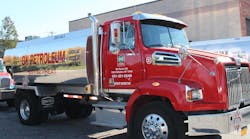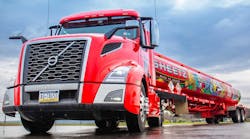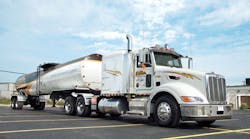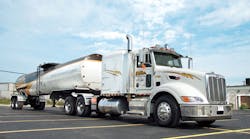JEFF DILLON, founder and president of Dillon Transport Inc, lists three keys to success for his company: Be there when the customer expects you; deliver a quality customer experience with every load; and find a solution when the customer needs it.
Delivering on those objectives has enabled Dillon to build a thriving tank truck carrier operation that serves customers throughout the eastern half of the United States. Based in Burr Ridge, Illinois, the 30-year-old trucking company runs a fleet that includes 280 late-model tractors and 350 tank and dry bulk trailers.
“We are succeeding and thriving because everyone at this company — from top to bottom — recognizes that our customers are our top priority,” Dillon says. “That was our priority when we started this company, and we never forget the value of our relationships with our customers and the importance of providing the very best possible service with each load.
“We have a young management team that works hard and is enthusiastic about this business. We have grown to a good size that enables us to serve large construction projects needing large volumes of asphalt. At the same time, we are very flexible and can respond quickly to special requests from customers.
“We believe that focus on customer relationships has helped carry us through the current recession. We were able to grow 8% during the worst of the recession in 2009, which was impressive during a year that saw 450 trucking companies shut down in the fourth quarter alone. We continued to grow during 2010, and we expect revenues to reach $50 million in 2011.
“Quite a lot transportation capacity is gone from the marketplace now, and that is bringing opportunities for us. We're picking up new lanes of traffic, and we are moving into some new industries. We feel like we are at the ground floor on many of the new products we have begun hauling, and that is going to drive our future growth.”
Steady growth
Dillon Transport has recorded steady annual growth since its start in 1980 as a construction hauler with a single tractor and dump trailer rig. The company's biggest growth spurt came during the 2007-2008 period when revenues surged from $25 million to $43 million.
From the very beginning, Dillon Transport managers sought out expansion opportunities. By 1985, the carrier had bought its first tank trailers and was expanding into asphalt hauling. Geographic expansion beyond the upper Midwest started in 1994 when Dillon Transport began hauling roofing asphalt for a shipper in Savannah, Georgia.
Today, the carrier operates out of 15 terminals serving 25 states. The newest terminal was opened in early 2010 in Heidelberg, Mississippi, to support an asphalt plant.
“Our primary focus is east of the Rocky Mountains,” says Charles Musgrove, vice-president of Dillon Transport. “Our company will see most of its growth in that region.”
Within the region, the Dillon Transport management team is working aggressively to diversify the range of products transported. New products hauled over the past year include resin, #6 oil, phosphoric acid, locomotive lubricants, and industrial minerals.
“We want business with sustainability that will enable us to keep growing,” Musgrove says. “We're looking at more opportunities in the oilfield, and we want to handle more renewable products, like biofuels. We see a lot of potential for liquefied natural gas.”
Asphalt focus
Construction materials currently account for about 80% of the cargoes hauled by Dillon Transport. Asphalt is the dominant construction product hauled, and will remain very important. Construction-related cargoes include industrial minerals and other dry bulk products.
“We believe 2011 will be a positive year for asphalt,” Dillon says. “I expect demand to increase slightly while supply will remain stagnant. The asphalt industry has changed and is more volatile today. We've lost refining capacity in the United States, and supplies are tighter.”
US refineries and other asphalt producers continue to reduce their asphalt output through new technologies or degradation of refining capacity. In addition, asphalt shipments from Venezuela have been curtailed. “This means our customers must develop new supply points to meet their growing needs,” Dillon says. “The end result is that we are serving our customers over new and longer supply lanes. Our drivers are now spending longer amounts of time on construction projects — four to six weeks at a stretch in some cases.”
Despite the challenges, asphalt remains a critical construction material. “We see more use of asphalt emulsion in road repairs, and asphalt is still used as a base when concrete roads are built,” Dillon says. “Asphalt is being used in many of the highway resurfacing projects that are part of the federal government's economic stimulus program.”
Outstanding drivers
Managing an increasingly diverse shipment portfolio takes good oversight, outstanding drivers, and a very well specified fleet. Operations are directed with the help of McLeod software that enables real-time dispatch. A GPS-based fleet management system tracks the location of every tractor-trailer rig in the fleet every minute of the day. In the near future, the Dillon Transport website will provide customers with their own portal to track shipment and paperwork.
Each Dillon Transport terminal has its own dispatchers. “We need local dispatchers for the various markets we serve,” Musgrove says. “We believe it is important to work with our customers one-on-one.”
Drivers are part of the one-on-one effort. Dillon Transport uses only company drivers, and management makes it clear that they are the face of the company to most customers. “We hire professional and healthy drivers, and we give them the training needed to do the job safely and in a customer-focused manner,” Musgrove says.
He acknowledges that finding good drivers has become more difficult. “We've had to become more creative in reaching out to potential drivers, and we are having success at that,” he says. “We produced a television commercial earlier this year that we posted on You Tube. We set up a blog online to tell drivers about Dillon Transport.
Tough requirements
Despite the market challenges, the carrier has not relaxed driver qualification requirements. Applicants are carefully screened to ensure professionalism and experience, according to Mark Brinkman, Dillon Transport safety director.
Dillon Transport page 2...
“That's a big reason we can boast one of the best safety records and have one of the lowest out-of-service ratings in the industry,” he says. “Credit for the great safety record goes to our drivers and to our safety and driver training teams that monitor our operations.
Plenty of work has gone into preparation for the Comprehensive Safety Analysis (CSA) program rollout by the Department of Transportation. “We started monitoring our CSA score several months ago, and we have been working with our drivers to make sure they understand what the program means for them and the company,” Brinkman says.
Driver participation in the CSA program is encouraged with incentives that include a bonus for every violation-free roadside inspection. Drivers also benefit from the carrier's participation in the PrePass program.
“PrePass keeps our drivers out of the scales on most trips,” Brinkman says. “The system we use combines scale reporting and tolls. Less stop-and-start activity means fewer delays for drivers and better fuel economy.”
Safe fleet
To help ensure safety on the road, Dillon Transport runs a fleet of late-model, company-owned tractors. “We believe it is important to run a relative young tractor fleet,” Musgrove says. “It's part of our commitment to ensure safe, on-time deliveries for our customers and to give our drivers a quality working environment. Average tractors age is two years, and the trailer average is 4.5 years.”
The carrier bought 111 new tractors in 2008 for fleet upgrade and expansion. Prior to the recession, the company was running tractors on a four-year replacement schedule. In response to the 2010 engine rollout, the replacement cycle is being pushed out an additional year.
New tractors were still being added over the past year to handle business expansion. More tractor purchases are planned for 2011. “We'll buy at least 50 new tractors next year,” says Jeffrey Bonnema, Dillon Transport director of maintenance.
Most, if not all, of them will be Peterbilts. Until recently, Dillon Transport was a 100% Peterbilt fleet, but a few Volvo and Kenworth tractors were added this year.
“Why are we bringing in different makes of tractors?” Bonnema asked. “We're doing this because we want to make sure we have the best equipment on the road for our customers and our drivers. If there is new technology or something better, we want to know about it. We're always trying to stay ahead of the rest of the industry.”
SmartWay partner
As a part of the Environmental Protection Agency's SmartWay Transport Partnership, Dillon Transport also looks for components and systems that will reduce the carrier's impact on the environment. The carrier earned a 2008 SmartWay Excellence Award for vehicle specification improvements credited with reducing CO2 emissions by 3,558 tons.
The newest Peterbilt tractors added to the fleet are Model 386s with Cummins ISX engines rated for 450 horsepower. For the Volvo's, the carrier bought VNL300 daycabs and VNL430 sleepers, all with Volvo D13 engines. The new Kenworth T660 sleeper units were spec'd with Cummins ISM engines.
Automated transmissions are the fleetwide standard. New Peterbilts and Kenworths have the Eaton Fuller UltraShift Plus, and the Volvos were ordered with the Volvo I-Shift automatic transmission.
Despite the loss of the federal tax incentive, Dillon Transport continues to use biodiesel fuel in certain areas. “We've been using biodiesel blends since 2007,” Bonnema says. “We continue to use biodiesel in Illinois where we still have state incentives. We have run blends as high as B50 (50% biodiesel), but we are using B11 now.”
Dillon Transport spec'd plenty of driver features on the new tractors. In addition to premium-level interiors, cabs are outfitted with in-dash GPS units, Sirius radio, and high-quality driver seats. Sleeper units come with the Cummins ComfortGuard or Glacier Bay ClimaCab auxiliary power unit and Direct TV system.
All of the tractors carry Qualcomm's tracking and communication equipment. “We chose Qualcomm for the paperless driver log capabilities,” Musgrove says. “We have been on paperless logs for 10 years now, because we wanted to eliminate the hours-of-service violations we saw with paper logs. Paperless was the only real option.”
The fleet has standardized on the Holland no-lube fifthwheel. Running gear includes tire pressure monitoring, Bendix roll stability, Alcoa DuraBrite aluminum wheels, Michelin X One singles, and axles and other drivetrain components with synthetic lubricants. The new Volvo tractors were ordered with Bendix air disc brakes. SmartWay-approved Eco Flap mudflaps let air pass through reducing drag.
Trailer fleet
In the trailer fleet, the carrier's bread-and-butter asphalt tanker is built by E D Etnyre & Co and holds 7,200 gallons. The carrier runs both carbon steel and aluminum Etnyre units. The steel trailers have a 500°F capability and the aluminum units are rated for 375°F.
Polar Tank Trailer Inc supplies the other types of tanks used by the fleet. For dry bulkers, the carrier runs 1,040-cu-ft units for sand, frac sand, and granular. Hydrated lime is carried in 1,660-cu-ft bulkers. Jet fuel is transported in 9,000-gallon DOT407 aluminum tankers.
Asphalt trailers and dry bulkers have Air-Weigh digital scales that enable drivers to monitor gross combination weights during loading. Dry bulkers are specified with Salco's remote operated domelid to keep drivers on the ground and protect against falls.
Trailer running gear includes the Hendrickson Intraax axle and air suspension system with a lifting front axle for less rolling resistance when trailers are empty. Trailers also have the Meritor Tire Inflation by PSI and Meritor roll stability.
Much of the vehicle maintenance is handled in-house at the carrier's six shops. Tractor service levels are at 15,000 and 30,000 miles. Trailers are serviced on a 90-day and yearly schedule.
“We want to see our equipment in our own shops at least once a year,” Bonnema says. “I want our mechanics to closely inspect every piece of equipment to ensure we are only running safe and effective equipment.”
On the road, Dillon Transport has Paccar national maintenance accounts and maintenance accounts with the Petro/Truck Stops of America system. National tire service accounts are in place with Michelin and Bridgestone. The carrier has a national account with Blue Beacon for exterior washes.
“We believe we have built the best possible system to meet our customers' needs,” Dillon says. “We never lose sight of the promise we make to our customers to be there when they need us, deliver outstanding service with each load, and find ways to solve their problems.” ♦










